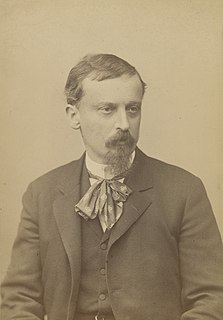A Quote by Spencer W. Kimball
There is no doubt that the life one leads, and the thoughts one thinks are registered plainly in his face.
Related Quotes
I know from experience that to one who thinks much and feels deeply, it often seems that he has only to put down his thoughts and feelings in order to produce something altogether out of the common; yet as soon as he sets to work he falls into a certain mannerism of style and common phraseology; his thoughts do not come spontaneously, and one might almost say that it is not the mind that directs the pen, but the pen leads the mind into common, empty artificiality.
God is the treasure, and where the treasure is, there is the heart. By this we may test our love to God. What are our thoughts most upon? Can we say we are ravished with delight when we think on God? Have our thoughts got wings? Are they fled aloft? Do we contemplate Christ and glory? A sinner crowds God out of his thoughts. He never thinks of God, unless with horror, as the prisoner thinks of the judge.
The poet presents the imagination with images from life and human characters and situations, sets them all in motion and leaves itto the beholder to let these images take his thoughts as far as his mental powers will permit. This is why he is able to engage men of the most differing capabilities, indeed fools and sages together. The philosopher, on the other hand, presents not life itself but the finished thoughts which he has abstracted from it and then demands that the reader should think precisely as, and precisely as far as, he himself thinks. That is why his public is so small.
So I suppose I do not know how he really looked, and, in fact, I suppose I shall never know, now, for he was plainly an object created in the mode of fantasy. His image was already present somewhere in my head and I was seeking to discover it in actuality, looking at every face I met in case it was the right face - that is, the face which corresponded to my notion of the unseen face of the one I should love, a face created parthenogeneticallyby the rage to love which consumed me.
Beth,” he said simply, his flawless face lit up with anticipation. “There is no doubt in my mind that we belong together, but to spend the rest of my life with you would be an honor and commitment that I would cherish.” He paused, his clear, blue eyes luminous. My breath caught in my throat, but Xavier only smiled. “Beth,” he repeated. “Will you marry me?” The look on his face was pure happiness.
If you engage in positive thinking to overcome negative thoughts, the negative thoughts are still there acting. That's still incoherence. It's not enough just to engage in positive thoughts when you have negative thoughts registered, because they keep on working and will cause trouble somewhere else.
The nobler sort of man emphasizes the good qualities in others, and does not accentuate the bad. The inferior does the reverse. . . . The nobler sort of man pays special attention to nine points. He is anxious to see clearly, to hear distinctly, to be kindly in his looks, respectful in his demeanor, conscientious in his speech, earnest in his affairs. When in doubt, he is careful to inquire; when in anger, he thinks of the consequences; when offered an opportunity for gain, he thinks only of his duty.
We forget that, although freedom of speech constitutes an important victory in the battle against old restraints, modern man is in a position where much of what "he" thinks and says are the things that everybody else thinks and says; that he has not acquired the ability to think originally - that is, for himself - which alone gives meaning to his claim that nobody can interfere with the expression of his thoughts.































